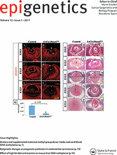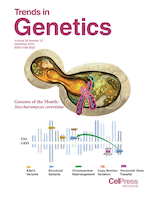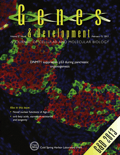
Epigenetics
Scope & Guideline
Transforming Understanding of Epigenetic Mechanisms
Introduction
Aims and Scopes
- Investigation of DNA Methylation and Gene Expression:
The journal extensively covers research on how DNA methylation patterns influence gene expression, providing insights into the biological processes underlying development, disease, and environmental responses. - Epigenetic Regulation Mechanisms:
Papers published often explore various mechanisms of epigenetic regulation, including histone modifications, non-coding RNAs, and chromatin remodeling, contributing to a deeper understanding of gene regulation. - Clinical Implications and Biomarkers:
Research often focuses on the identification of epigenetic biomarkers for disease diagnosis, prognosis, and treatment, highlighting the translational aspect of epigenetic studies in clinical settings. - Transgenerational Epigenetic Inheritance:
The journal includes studies that investigate how epigenetic modifications can be inherited across generations, shedding light on the implications for developmental biology and evolutionary processes. - Environmental and Lifestyle Factors:
Research is frequently centered on the impact of environmental exposures and lifestyle choices on epigenetic modifications, emphasizing the interplay between genetics and the environment.
Trending and Emerging
- Role of m6A RNA Modifications:
There is an increasing focus on N6-methyladenosine (m6A) modifications in RNA and their regulatory roles in various biological processes and diseases, including cancer. This emerging theme highlights the significance of RNA modifications in epigenetic regulation. - Integration of Multi-Omics Approaches:
Recent studies are increasingly utilizing multi-omics strategies that combine genomics, transcriptomics, and epigenomics to provide a comprehensive understanding of complex biological systems and disease mechanisms. - Impact of Environmental Exposures:
Research examining the effects of environmental factors, such as pollutants and dietary components, on epigenetic modifications is gaining traction, emphasizing the relevance of epigenetics in public health and environmental sciences. - Transgenerational Effects of Epigenetics:
There is a notable growth in studies addressing the transgenerational impact of epigenetic changes, particularly in relation to stress and environmental factors, reflecting a broader interest in understanding long-term epigenetic inheritance. - Epigenetic Therapeutics:
The development of epigenetic therapies, including the use of epigenetic inhibitors to treat various diseases, particularly cancer, is a rapidly emerging focus area, indicating a shift towards clinical applications of epigenetic research.
Declining or Waning
- Basic Genetic Studies Without Epigenetic Context:
There appears to be a waning interest in studies that focus solely on basic genetic mechanisms without integrating epigenetic perspectives, as the field increasingly emphasizes the importance of epigenetic regulation. - Overemphasis on Single Modifications:
Research that concentrates only on single types of epigenetic modifications, such as DNA methylation without considering histone modifications or chromatin structure, is becoming less common as a more holistic approach is favored. - Reduction in Animal Model Studies:
There is a noticeable decrease in studies relying solely on traditional animal models for epigenetic research, potentially due to the rise of more sophisticated in vitro and computational methods that provide broader insights. - Limited Focus on Historical Epigenetic Studies:
Older studies that primarily describe historical context or foundational knowledge in epigenetics are less frequently published, as the field moves towards innovative and application-focused research.
Similar Journals

Non-Coding RNA
Fostering Collaboration in Non-Coding RNA ExplorationNon-Coding RNA is a prestigious open-access journal published by MDPI, based in Switzerland, dedicated to the significant and rapidly evolving field of non-coding RNA research. Established in 2015, this journal has quickly become an essential resource for researchers and professionals, showcasing innovative studies and breakthroughs related to the functions and mechanisms of non-coding RNAs in various biological processes. With an impressive Q1 ranking in Biochemistry and strong rankings in Genetics and Molecular Biology, Non-Coding RNA consistently reflects the highest standards of academic publishing. The journal provides comprehensive access options, granting researchers worldwide the ability to disseminate and access high-quality research without subscription barriers. As the landscape of genomics and molecular discoveries continues to expand, the journal aims to foster interdisciplinary exchanges and collaborations, making it a vital platform for advancing knowledge and innovation in this critical area of biological science.

GENES TO CELLS
Fostering Innovation in Genetic and Cellular ResearchGENES TO CELLS is a distinguished peer-reviewed journal published by Wiley, offering valuable insights into the intricate world of cell biology and genetics. With an ISSN of 1356-9597 and an E-ISSN of 1365-2443, this journal has been contributing to the academic community since its inception in 1996 and will continue its publishing journey until 2024. Recognized with a category quartile ranking of Q3 in both Cell Biology and Genetics, and Q2 in Medicine (Miscellaneous) as of 2023, it serves as an important platform for disseminating innovative research and reviews in molecular biology and related fields. Although it does not currently offer open access, the journal caters to a diverse readership by providing comprehensive studies that are essential for professionals, researchers, and students aiming to deepen their understanding of genetic mechanisms and cellular functions. Situated in the United Kingdom, GENES TO CELLS continues to play a pivotal role in shaping the future of biological research.

SEMINARS IN CELL & DEVELOPMENTAL BIOLOGY
Leading Insights into Developmental ProcessesSEMINARS IN CELL & DEVELOPMENTAL BIOLOGY is a premier journal published by Academic Press Ltd - Elsevier Science Ltd, focusing on the vital domains of cell and developmental biology. With an impact factor that reflects its rigorous contributions to the field, this journal embodies the highest standards of academic excellence, currently ranking in the Q1 quartile for both Cell Biology and Developmental Biology categories as of 2023. Researchers and practitioners will appreciate its robust Scopus ranking, placing it within the top tiers of developmental biology and cell biology, with percentile ranks of 94th and 90th respectively, showcasing the journal's influential presence in the scientific community. The journal aims to disseminate comprehensive reviews, cutting-edge research articles, and significant advances in the understanding of cellular mechanisms and developmental processes, thereby catering to a diverse audience that includes researchers, scholars, and students dedicated to the life sciences. Given its commitment to open access, SEMINARS IN CELL & DEVELOPMENTAL BIOLOGY promotes widespread dissemination of knowledge, enhancing collaborative research efforts and driving innovation across biological disciplines.

Cell Discovery
Fostering Global Collaboration in Cellular ResearchCell Discovery, published by SPRINGERNATURE, is a premier open access journal in the dynamic fields of Biochemistry, Cell Biology, Genetics, and Molecular Biology. Since its inception in 2015, this journal has established itself as a key platform for disseminating high-impact research and is recognized with a Q1 ranking across all its core categories for the year 2023. With its remarkable Scopus rankings—7th in Genetics, 9th in Biochemistry, 13th in Molecular Biology, and 15th in Cell Biology—Cell Discovery positions itself among the elite journals in life sciences, showcasing the most innovative breakthroughs and comprehensive reviews. Based in the United Kingdom, this journal operates under an open access model, ensuring that groundbreaking discoveries are readily available to researchers, professionals, and students around the globe. With a commitment to advancing scientific knowledge, Cell Discovery welcomes contributions that push the frontiers of our understanding in cellular and genetic sciences.

TRENDS IN GENETICS
Connecting Discoveries to the Future of GeneticsTRENDS IN GENETICS, published by CELL PRESS, is a leading journal in the field of genetics, recognized for its significant impact on research and advancements in the discipline. With an impressive Scopus ranking of #10 out of 347 in the category of Genetics and a 97th percentile ranking, this journal stands as a premier platform for publishing innovative, high-quality articles that shape the future of genetic research. Since its inception in 1985, TRENDS IN GENETICS has been at the forefront of the genetic sciences, continuously disseminating crucial findings while maintaining a strong commitment to scientific rigor and integrity. Although it does not currently offer open access options, its rigorous peer-review process ensures that only the most relevant and groundbreaking studies make it to publication. Scholars and practitioners in genetics will find this journal to be an invaluable resource for keeping abreast of the latest developments, trends, and methodologies that drive the field forward.

GENES & DEVELOPMENT
Exploring the Frontiers of Gene Function and DevelopmentGENES & DEVELOPMENT, published by COLD SPRING HARBOR LAB PRESS, stands as a premier journal in the fields of Developmental Biology and Genetics, boasting a remarkable impact factor that reflects its prestigious position in the academic community—ranking Q1 in both disciplines as of 2023. Since its inception in 1987, this journal has been at the forefront of disseminating cutting-edge research, effectively bridging the gap between laboratory breakthroughs and their applications in health and disease. Researchers and professionals rely on GENES & DEVELOPMENT for its rigorous peer-review process and its commitment to promoting innovative studies that unravel the complexities of gene functions and developmental processes. With Scopus rankings placing it in the top percentile among its peers, this journal serves as a vital resource for students and established scientists alike, aspiring to expand their knowledge and contribute to the ever-evolving landscape of genetic and developmental research.

GENE
Illuminating the Path of Genetic AdvancementsGENE, an esteemed journal published by Elsevier, serves as a vital resource for researchers and professionals in the fields of genetics and medicine. With an ISSN of 0378-1119 and an E-ISSN of 1879-0038, this scholarly journal has been at the forefront of genetic research since its inception in 1976 and is set to continue until 2025. Situated in the Netherlands, GENE is recognized for its significant contributions, reflected in its Q2 ranking in both Genetics and Miscellaneous Medicine categories for 2023. This positioning within the Scopus rankings demonstrates its impact and relevance in a competitive field, where it holds the rank of #129 out of 347 in Genetics, placing it within the 62nd percentile. Although it does not offer open access options, GENE provides invaluable insight into contemporary genetic research, thereby fostering academic discussions and advancements. Researchers, professionals, and students alike will find GENE an essential platform for disseminating knowledge and exploring innovative developments in genetics and associated sciences.

Epigenetics Insights
Fostering Innovation in Epigenetics and BeyondEpigenetics Insights is an esteemed open-access journal published by SAGE Publications Ltd since 2018, dedicated to advancing the field of epigenetics and its implications in biochemistry and genetics. With an ISSN of 2516-8657, this journal has quickly established itself as a significant player in the academic landscape, positioned in the Q3 category for both Biochemistry and Genetics based on the 2023 rankings. Our mission is to provide a forum for high-quality research that delves into the complexities of epigenetic mechanisms, their biological significance, and their potential applications in medicine and biotechnology. By embracing the principles of open access, we ensure that cutting-edge findings are readily available to researchers, professionals, and students worldwide, thereby fostering knowledge sharing and collaborative advancements in this dynamic field. With articles indexed in Scopus and a growing citation impact, Epigenetics Insights aims to engage a diverse audience and inspire innovative research practices within the global scientific community.

GENOME
Innovating the Future of Biotechnology and Molecular BiologyGENOME is a leading peer-reviewed journal published by Canadian Science Publishing, dedicated to advancing the field of genetics, biotechnology, and molecular biology. With a strong commitment to disseminating high-quality research, GENOME has earned a reputable spot in the academic community, boasting a Q2 classification in Biotechnology and Medicine (miscellaneous), and a Q3 rank in Genetics and Molecular Biology for 2023. The journal, identified by its ISSN 0831-2796 and E-ISSN 1480-3321, publishes innovative studies that span from 1987 to 2024, ensuring a rich historical context while addressing contemporary challenges in the field. Researchers and professionals are encouraged to contribute and engage with content that shapes the landscape of genetic research. Although the journal does not currently provide open access, it remains a vital resource for those committed to the exploration of genomic sciences, making it an essential read for both seasoned researchers and students alike.

Molecular Cancer
Transforming cancer knowledge into clinical practice.Molecular Cancer, published by BMC, stands as a premier open access journal dedicated to advancing our understanding of cancer biology, treatment, and prevention since its inception in 2002. With an impressive Q1 ranking in the domains of Cancer Research, Molecular Medicine, and Oncology, this journal occupies a significant position in the academic landscape, emphasizing high-quality research that influences clinical practices and future studies. The journal is indexed in leading databases with exceptional Scopus ranks, reflecting its rigorous peer-review process and impactful contributions to the field, where it ranks in the top 2-3 positions across various relevant categories. Based in the United Kingdom, Molecular Cancer offers researchers worldwide a valuable platform for disseminating innovative findings that drive the biomedical community forward. The journal's open access model ensures that groundbreaking research is freely accessible, fostering collaboration and knowledge sharing among professionals, students, and academics alike. Explore cutting-edge developments in cancer research through Molecular Cancer and join a community committed to improving patient outcomes and advancing scientific discovery.